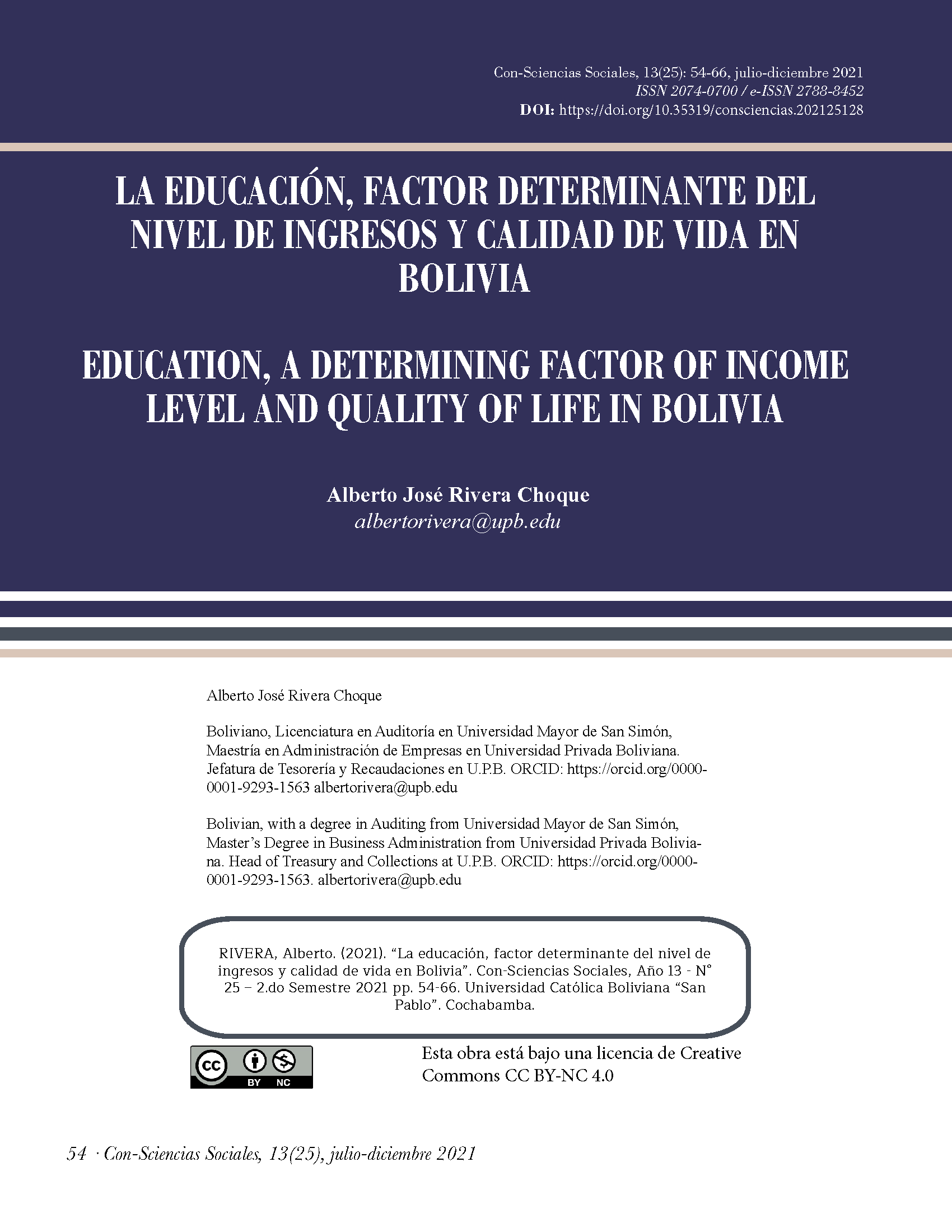Education, a determining factor of income level and quality of life in Bolivia
DOI:
https://doi.org/10.35319/consciencias.202125128Keywords:
Education, Poverty, Opportunities, IncomeAbstract
In the research, education was considered to be the base to get out of poverty and improve people’s quality of life, but considering access to equitable and quality education. To do this, the study set two objectives: At first, to determine the degree of correlation between income level of the people and the schooling and, in a second phase, to measure the influence of schooling years and the educational level in the determination of income. The data used correspond to the Bolivian national employment survey. The results highlight that education has a significant correlation with income level. Subsequently, the proportional influence was determined with data, the higher the schooling and the educational level, the higher the income received and through this a better quality of life. Finally, a comparison was made with a model country regarding educational policies, managing to identify the factors that need to be corrected in Bolivia to achieve social equality and generate opportunities for the development of the country and families.
Downloads
References
Becker, G. (1964). Human Capital: A theoretical and empirical analysis, with special
Reference to education, National Bureau of Economic Research (NBER), N. 80, Series Generales, Estados Unidos.
Braathe, HJ y Otterstad, AM (2014). Education for All in Norway: Unpacking Quality and Equity DOI: https://doi.org/10.1016/j.sbspro.2014.01.368
Contreras, D. y Gallegos, S. (2007). Descomponiendo la desigualdad salarial en América Latina: ¿Una década de cambios? CEPAL.
Fukusaki, G. Y. (2007). Retornos a la educación superior en el mercado laboral: ¿vale la pena el esfuerzo? (Vol. 78). Universidad del Pacífico.
Fullan, M. y Escudero, J. M. (2002). Los nuevos significados del cambio en la educación. Barcelona. Octaedro.
Galassi, G L y Andrada, MJ. (2011). Relación entre educación e Ingresos en las regiones geográficas de Argentina. Papeles de población, 17(69), 257-290.
Heckman, J (1979). “Sample Selection Bias as a Specification Error”, Econométrica, vol. 47, núm. 1, enero. DOI: https://doi.org/10.2307/1912352
Instituto Nacional de Estadística de Bolivia (INE). (2019) Encuesta Nacional de Empleo 2019. Bolivia. INE
Jemio, L. C. (2014). Desafíos del sistema educativo boliviano (No. 09/2014). Development Research Working Paper Series.
Johnson, H (1975). On Economics and Society. University of Chicago Press, Chicago.
Krishnakumar, J y Nogales, R. (2020). Public Policies and Equality of Opportunity for Wellbeing in Multiple Dimensions: A Theoretical Discussion and Evidence from Bolivia. Social Indicators Research. 149. https://link.springer.com/article/10.1007%2Fs11205-019-02245-2 DOI: https://doi.org/10.1007/s11205-019-02245-2
Lozada, Michelle. (2015). Educación Experiencia laboral e ingresos laborales. Infinitum Huacho. 5. 69-75. DOI: https://doi.org/10.51431/infinitum.v5i2.305
Mincer, J.(1974). Schooling, experience and earnings, National Bureau of Economic Research (NBER), Nueva York, Estados Unidos.
Ministerio dde Desarrollo Productivo y Economía Plural (2015). Reglamento para El Registro y Acreditación de Unidades Productivas, http://www.probolivia.gob.bo/sites/default/files/compilacion-reglamento-registro-a-acreditacion-09-2015.pdf
Mounsey, A. (2014). Jamaica: tamaño de las empresas y remuneración laboral en el sector privado. Cepal Review, 112, 7792. DOI: https://doi.org/10.18356/e574b90e-es
Muriel, B. (2010). Determinantes de los ingresos laborales en las zonas urbanas de Bolivia (No. 06/2010). Development Research Working Paper Series.
Nina, O.; Molina, O.; Barrientos, P. y Aguilar, P. (2006). ¿Es equitativa en Bolivia la asignación del gasto público en educación? Revista Latinoamericana de Desarrollo Económico, (7), 57-96. DOI: https://doi.org/10.35319/lajed.20067239
Nordin, M., Persson, I. y Rooth, D. O. (2010). Education–occupation mismatch: Is there an income penalty? Economics of education review, 29(6), 1047-1059. DOI: https://doi.org/10.1016/j.econedurev.2010.05.005
Oaxaca, R. (2006). Male-Female Wage Diferentials in Urban Labor Markets. International
Economic Review, 14(3), 693-709. https://doi.org/10.2307/2525981 DOI: https://doi.org/10.2307/2525981
Ordaz, J L (2007). México: capital humano e ingresos. Retornos a la educación, 1994-2005, Serie Estudios y Perspectivas, núm. 90, CEPAL.
Organización de Naciones Unidas (ONU). (2017) Objetivos de desarrollo Sostenible 2017. P. 15 DOI: https://doi.org/10.30854/anf.v15.n25.2008.176
Pearson, K. (1897) Mathematical contributions to the theory of evolution on a form of spurious correlation which may arise when indices are used in the measurement of organs. Proceedings of the royal society of London, 1897, vol. 60, no 359-367, p. 489-498. DOI: https://doi.org/10.1098/rspl.1896.0076
Rawls, J (1971). A Theory of Justice, Cambridge, Harvard University Press. DOI: https://doi.org/10.4159/9780674042605
Restrepo, L. F. y González, J. (2007). From pearson to Spearman. Revista Colombiana de Ciencias Pecuarias, 20(2), 183-192.
Riquelme Silva, G y Olivares-Faúndez, V. E. (2015). Rentabilidad del trabajo en Chile: Análisis de la evolución de los retornos por nivel educativo. Ciencia y trabajo, 17(52), 69-76. https://dx.doi.org/10.4067/S0718-24492015000100012 DOI: https://doi.org/10.4067/S0718-24492015000100012
Roemer, J.E. (1998), Equality of Opportunity, Cambridge, Massachusetts, Harvard University Press. DOI: https://doi.org/10.4159/9780674042872
Rozenberg, A. (2000). John SHEAHAN, 2001. La Economía Peruana desde 1950. Buscando una Sociedad Mejor. Lima: IES Instituto de Estudios Peruanos, 269 pp. Economía, 23(46), 126-134. DOI: https://doi.org/10.18800/economia.200002.006
Schultz, T W. (1960), “Capital formation by Education”, Journal of Political Economy, 68 (6), The University Chicago Press, Chicago, pp. 571-583. DOI: https://doi.org/10.1086/258393
Sen, A. (1995). Nuevo examen de la desigualdad. Madrid. Alianza. Cambridge University
Sen, A., Bravo, A. M. y Schwartz, P. (1999). Nuevo examen de la desigualdad. Madrid: Alianza.
Smith, Adam (1776), Investigación de la naturaleza y causas de la riqueza de las naciones, Alianza, Madrid.
Villegas Q. H.; Vargas, R. J. y Pérez, O. D. (2016). Impacto de la educación sobre la pobreza en Bolivia. Economía Coyuntural, 1(4), 33-60. DOI: https://doi.org/10.5354/0719-6296.2015.38381

Downloads
Published
How to Cite
Issue
Section
License
Copyright (c) 2021 Revista Con-Sciencias Sociales

This work is licensed under a Creative Commons Attribution-NonCommercial 4.0 International License.









